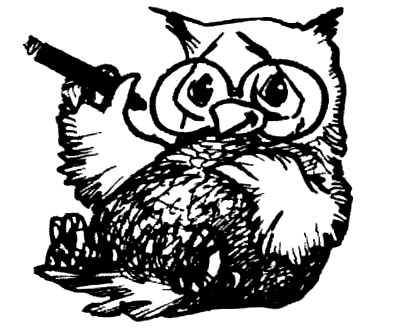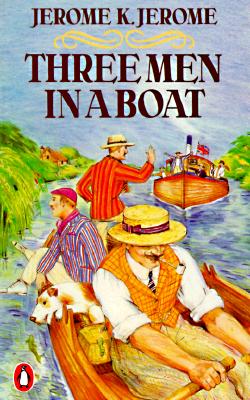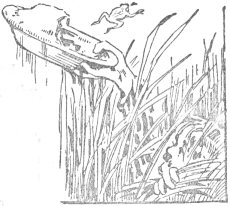There seemed weight in this objection, and we discarded the heavenly theory.
“I suppose the truth of the matter is,†suggested George, descending to the commonplace and practicable, “that there has been an earthquake.â€
And then he added, with a touch of sadness in his voice: “I wish he hadn’t been carving that pie.â€
With a sigh, we turned our eyes once more towards the spot where Harris and the pie had last been seen on earth; and there, as our blood froze in our veins and our hair stood up on end, we saw Harris’s head—and nothing but his head—sticking bolt upright among the tall grass, the face very red, and bearing upon it an expression of great indignation!
George was the first to recover.
“Speak!†he cried, “and tell us whether you are alive or dead—and where is the rest of you?â€
“Oh, don’t be a stupid ass!†said Harris’s head. “I believe you did it on purpose.â€
“Did what?†exclaimed George and I.
“Why, put me to sit here—darn silly trick! Here, catch hold of the pie.â€
And out of the middle of the earth, as it seemed to us, rose the pie—very much mixed up and damaged; and, after it, scrambled Harris—tumbled, grubby, and wet.
He had been sitting, without knowing it, on the very verge of a small gully, the long grass hiding it from view; and in leaning a little back he had shot over, pie and all.
He said he had never felt so surprised in all his life, as when he first felt himself going, without being able to conjecture in the slightest what had happened. He thought at first that the end of the world had come.
Harris believes to this day that George and I planned it all beforehand. Thus does unjust suspicion follow even the most blameless for, as the poet says, “Who shall escape calumny?â€
Who, indeed!
CHAPTER XIV.
Wargrave.—Waxworks.—Sonning.—Our stew.—Montmorency is sarcastic.—Fight between Montmorency and the tea-kettle.—George’s banjo studies.—Meet with discouragement.—Difficulties in the way of the musical amateur.—Learning to play the bagpipes.—Harris feels sad after supper.—George and I go for a walk.—Return hungry and wet.—There is a strangeness about Harris.—Harris and the swans, a remarkable story.—Harris has a troubled night.
We caught a breeze, after lunch, which took us gently up past Wargrave and Shiplake. Mellowed in the drowsy sunlight of a summer’s afternoon, Wargrave, nestling where the river bends, makes a sweet old picture as you pass it, and one that lingers long upon the retina of memory.


